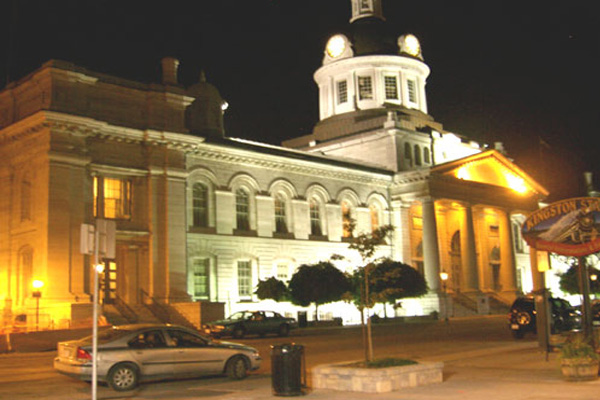Travel Canada
RomWell Travel Advisory
Kingston
The beautiful city of Kingston is conveniently located half-way between Montreal to the east, Toronto to the west, Ottawa to the north and Syracuse, New York to the south. This interesting city is also accessible by air, rail or highway from Canada's largest urban centres, making it a convenient destination.
Known as the "Limestone City", Kingston has been shaped by powerful sense of geography. The city was built at a watery cross roads, where the southernmost end of Rideau Canal meets Lake Ontario at the mouth of the St. Lawrence River and the western gateway to the Thousand Islands.
Kingston, once the first Capital of Canada, has evolved into a vibrant city and the largest port within the world famous Thousand Islands region. Culture and the arts abound, along with fabulous shopping, dining and limitless recreational experiences.
Well preserved, Kingston's heritage is present in every stone, brick and timber of its electic architecture... within the trees of its many parks and green spaces... upon the breezes as they rise over the sun-kissed waterfront... and in the hearts of its residents who delight in an idylic lifestyle. Kingston has evolved to exude a special energy.
Kingston boasts one of the most vibrant and historic downtowns in Canada. Kingston's dining experience can compete with the largest cultural centres. Original descendants from the United Kingdom and France have maintained their culinary heritage combined with vibrant Asian, Greek, Italian and Portuguese communities and their delightful impact.
Kingston's magnificiently preserved heritage architecture is, to this day, an electic reflection of the two cultures that once called it home. The land where Kingston is situated was first discovered by French explorer Robert Cavalier Sieur de la Salle in the late 1600s. The settlement was formalized with the erection of Fort Frontenac. In 1758, the British captured the Fort and kingston was subject to a new ruler and culture. Shipbuilding for commerce and the military was big business in the 19th century, fueling Kingston's expansion and prominence as a Canadian community. The War of 1812 between the British and the Americans led to the fortification of Kingston with Fort Henry and the five Martello Towers. The first Canadian Parliament opened in Kingston in 1841. Because of its geographic proximity to the U.S. and renewed disputes between the British and the Americans, the National Seat of Government was moved in 1844 to Montreal and later, to Ottawa in 1867.
Troubles with the Americans led to the construction of the Rideau Canal system in 1826 to create a reliable supply route from Kingston to Bytown (now Ottawa) should the Americans blockade the St. Lawrence River. Considered to be the engineering feat of the 19th century, the Canal was never used for military purposes. It is enjoyed today by thousands of recreational boaters.
Kingston is home to fabulous live theatre, concerts, festivals and events. Kingston is also the port of call for fabulous Thousand Islands cruising. Step aboard a riverboat for a scenic tour or enjoy dining and entertainment aboard glass top ship. You can also sail for several days aboard a beautiful steamboat replica from Kingston all the way to Montreal or Quebec City. Kingston's shores offer a myriad of water-sports, or if you are land-lover, just enjoy the colorful vistas from any of Kingston's waterfront parks. You could also take a tour of Kingston's sights aboard the Confederation Tour Trolley.
Visit Bellevue House National Historic Site a rare and fine example of Italianate villa architecture in Canada and a former home to Sir John A. Macdonald, Canada's first prime minister. Sir John A. Macdonald, and his family made Bellevue House their home from 1848 to 1849.
Discover Canada's nautical heritage at the Marine Museum of the Great Lakes, including the 3,000 ton ice breaker Alexander Henry. Marine museum is the best place to explore and connect with the maritime heritage of Kingston and the Great Lakes.
Visit Fort Henry National Historic Site, a fully restored 19th century citadel, the timekeeper of Canada's 1860s military and civilian history. Fort Henry is the largest fortification west of Quebec City. Fort Henry heats up Wednesday evenings throughout July and August with historic performances unique in all the world Sunset Ceremonies performed entirely by college and university students.
Related Links:
 Thousand Islands - Unparalleled Natural Beauty Rich in History
Thousand Islands - Unparalleled Natural Beauty Rich in History



